In some ways, Quakers aren’t as Quaker as we used to be.
For example, it is hard to imagine a Friend being read out of meeting for filing bankruptcy, as would have happened throughout most of our history. Our testimony against observing days and times is itself unevenly observed, with some Friends meetings hosting Easter egg hunts, while others erect Christmas trees in the entryway. Friends’ testimony on temperance, never as universal as the others, is nowhere in evidence among Friends of my acquaintance, most of whom share the view that since wine was good enough for Jesus, it is certainly good enough for us. These and other “testimonies”—the shared practices that witness to the Spirit’s work within and among us—that used to set Quakers apart from “the world” have been greatly weakened over the last 100 years, as more matters have been left to individual conscience and as Friends have collectively lost our taste for the muscular eldering required to maintain the consistency of corporate disciplines in the absence of strong community ties. Nevertheless, the peace testimony endures, remaining a key part of our identity as Friends.
But has the peace testimony had its day? In recent decades, Friends and others invested in the future of our Society have questioned whether the blanket refusal of war is intrinsically untenable, even immoral. From Scott Simon’s “Reflections on the Events of September 11,” published in the wake of the 9/11 attacks, to Bryan Garman’s recent reflection “The Peace Testimony and Ukraine,” Friends are asked whether we can truly commit to opposing all war, or if instead we have a moral duty to push for intervention—including military intervention, if necessary—on behalf of victims of organized violence. The reality of human suffering in violent conflict is incontestable. If our own use of force could end the conflict, how can we justify an automatic and uncritical refusal to use that force? Pacifism, though lovely in principle, is not always effective, and with democracy under attack and fascism on the march, the world is in desperate need of effective solutions.
This statement—that the world needs effective solutions for the problems we face—may well be accurate. It certainly feels compelling. But if Friends desire to maintain our integrity as people who proclaim membership in a religious society, then rather than committing to a utilitarian approach to the peace testimony—is it useful; does it work?—we must seek a spiritual foundation for our commitment to peace. Mere pragmatism will not do. Let us seek that spiritual foundation together by considering this passage from the 1660 Declaration to Charles II, one of the most authoritative statements of our traditional testimony against war:
That the spirit of Christ, by which we are guided, is not changeable, so as once to command us from a thing as evil and again to move unto it; and we do certainly know, and so testify to the world, that the spirit of Christ, which leads us into all Truth, will never move us to fight and war against any man with outward weapons, neither for the kingdom of Christ, nor for the kingdoms of this world.
But we cannot simply rely on the centuries-old revelations of our Quaker ancestors to tell us where we are being led today. George Fox’s words still challenge us: “What canst thou say?”
Does the Spirit of Christ Exist?
Many Friends today, especially in the Liberal unprogrammed tradition where I make my home, are more comfortable speaking of “the Light” than of “God” or “the Spirit.” For some, this is a simple matter of using different terms to refer to the same Divine Source. But for others, the Light does not point to any separate Being or Power. Instead, the Light is simply my higher consciousness or my own internal compass. For such people, following the Light means doing what is most life-giving and authentic for me to do and following a leading means committing myself to what I personally think is right. For these Friends, there is no concept of a God beyond all human understanding. There is no space for a Lord who might demand that we do things that we do not want to do; things that may seem irrational, wrongheaded, or even—by the world’s standards—immoral. For Friends with this more humanistic orientation, utilitarian balancing is not only useful but essential, otherwise how could “my light” determine what is right and what to do? For these Friends, “does it work?” is a crucial question.
This stands in sharp contrast to the conception of early Friends, who identified the Light with Christ: “the true Light which enlightens every man that comes into the world,” as Friends like George Fox paraphrased John 1:9. The Light they knew was fully embodied in Jesus of Nazareth, and not only has the potential to bring us into conflict with our surrounding culture but is guaranteed to do so, just as it did Jesus, who “came to what was his own, and his own people did not accept him” (John 1:11). This conception of the Light—which may make us wicked or foolish in the eyes of the world—is what gave early Friends like Stephen Grellet the courage to preach to empty buildings, or like Mary Fisher to travel across a continent to share the gospel with a foreign monarch, or like Mary Dyer to face execution for preaching heresy.
So there are at least two “Lights” we might look to for guidance: the humanistic, psychological “Light of Reason” or the divine, authoritative “Light of Christ.” Knowing which we are referring to will determine whether we seek to follow it by gathering facts and using our brains to balance competing priorities—say, the harm caused by engaging in war versus the harm permitted by pacifism—or whether we seek to follow it by prayerfully opening our souls to the Divine Will.
Can We Accept a Spirit That Guides and Commands Us?
Early Friends often repeated the truth that we must each “work out [our] own salvation with fear and trembling” (Phil. 2:12); it is not enough to take another’s word for what is right. This could seem to imply a radical spiritual individualism, with each Friend deciding for themselves what is right, were it not for two key aspects of our traditional faith: first, that God will speak to us, and second, that we must gather with other faithful people to fully hear what God is saying.
When early Quakers did away with the layers of church hierarchy that characterized the Church of England in their time, they did so standing in the faith that they could know their Heavenly Father just as intimately as his son did: no longer were they mere servants of Christ, but friends (John 15:15). They were not rejecting the guidance of the Spirit but insisting on it: unfiltered, uncensored, and unadulterated by layers of priests and bishops. Friends traditionally did not rely on human speculations, which Fox called “airy notions,” but instead carefully listened to how God was calling.
If the modern Religious Society of Friends has ceased to believe in a God that both makes His will known and has the authority to expect our obedience, we have no choice but to make ourselves into the judges of what is right and what is wrong: there is nobody else to do the job! If that is the case, however, then we should be honest that what we worship and follow is our own intellect and our will, and not a Creator whose Life and Love animates the universe.
Moreover, it is significant that the statement of our peace testimony speaks of the Spirit guiding “us.” Friends have never placed the burden of discerning God’s will on individuals acting alone. Instead, we discern as a community: in light of our traditional witness; in light of the lives of those we know to be godly people; and in light of the Bible, particularly the ministry of Jesus and the testimony of the early church. When we gather to discern in this way, we do so with confidence, demonstrated in the famous Quaker painting The Presence in the Midst by James Doyle Penrose, that “where two or three are gathered in [Christ’s] name, [he is there] among them” (Matt. 18:20). Every individual determining truth for themselves is not Quakerism, it is Ranterism, a deception stamped out by early Friends because of how easily the individual is misled by pride and passion. Instead of leaving Friends to their own devices, we traditionally have come together to listen to the Light with the full conviction that God will make His will known if we earnestly seek it as a gathered body. But this corporate discernment, this gathering and waiting, is an often frustrating and time-consuming spiritual discipline that requires patience and humility. If we have given it up, and perhaps we have, let us say so plainly rather than pretending otherwise.
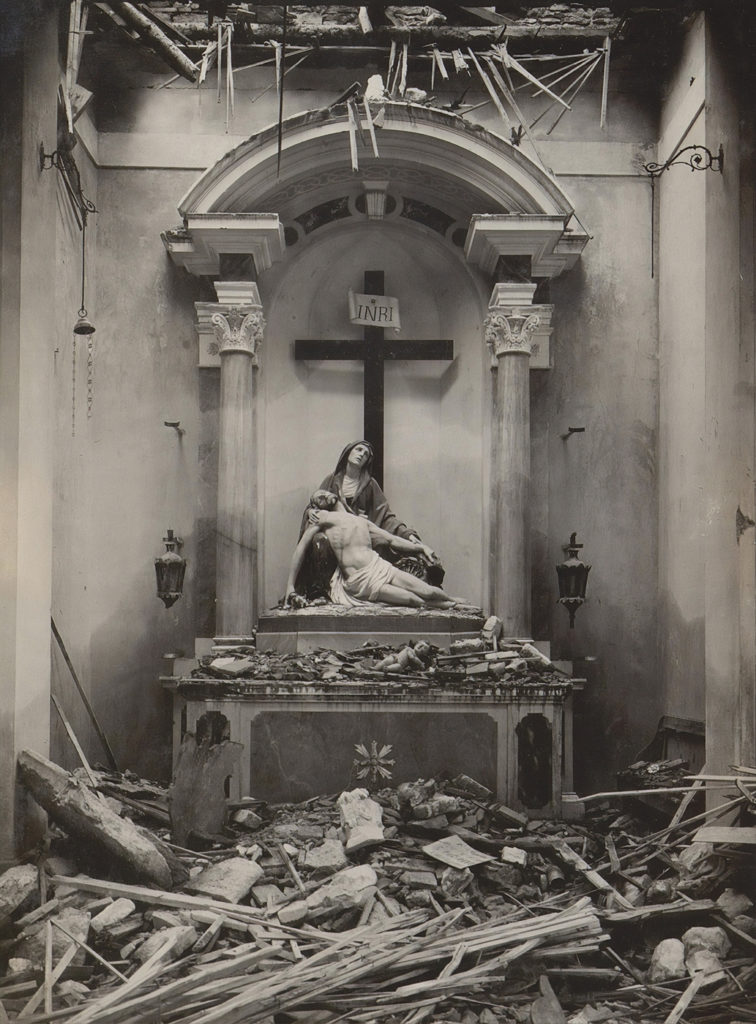
World War I destruction. Altar in the church of Segusino, Italy. Photo courtesy of Austrian National Library.
Do We Believe That God’s Will Changes over Time?
Early Friends believed that the Spirit is not changeable: the God who speaks to us today is the same God who spoke to the prophets and to the early Church. Friends, as members of a movement they saw as “primitive Christianity revived,” believed that religious rituals not present in the Bible should be discarded for a purer experience of worship “in spirit and in truth” (John 4:24), as they often said. They were also confident that any revelations they received would not contradict God’s will as expressed in Scripture. They therefore discerned how to walk in the Light by prayerful consideration of biblical “cloud of witnesses” (Heb. 12:1) and by considering whether a proposed practice would tend to encourage or discourage the fruit of the Spirit: “love, joy, peace, forbearance, kindness, goodness, faithfulness, gentleness, and self-control” (Gal. 5:22–23). For Friends who believed that divine revelation could not contradict itself, even across time and culture, a proposed change to the Quaker witness was more likely to take the Society away from God’s will than toward it. Therefore, a deliberate and prayerful process was necessary to ensure that a possible change was a response to a move of the Spirit, rather than a shift in culture.
Early Friends had many reasons for believing that God calls those who follow Him to oppose war. They were deeply moved by prophetic passages like the one in the biblical book of Micah promising that God shall judge among the nations who “shall beat their swords into plowshares, and their spears into pruning hooks; nation shall not lift up sword against nation, neither shall they learn war any more” (Micah 4:3). Many of us are familiar with Friend Edward Hicks’s paintings of the lion laying down with the lamb in the peaceable kingdom, another image that has inspired Friends for centuries. In that peaceable kingdom, those who abide there “will not hurt or destroy on all [God’s] holy mountain; for the earth will be full of the knowledge of the Lord as the waters cover the sea” (Isaiah 11:9). Jesus told his followers not to resist evildoers (Matt. 5:39), cautioning them that those who live by the sword—by the power of violence—will die by the sword as well (Matt. 26:52). And early Friends regularly cited Apostle Paul for the foundational Friends’ concept of the Lamb’s War, which cannot be carried out against flesh and blood, as other people can never be harmed by a people called to love their enemies; instead, those who fight evil must lean on righteousness, faith, and—yes—the gospel of peace (Eph. 6:12–17). George Fox alluded to this last passage among others in the 1660 Declaration, when he wrote:
Our weapons are spiritual, and not carnal, yet mighty through God, to the pulling down of the strongholds of sin and Satan, who is the author of wars, fighting, murder, and plots. Our swords are broken into ploughshares, and spears into pruning-hooks, as prophesied of in Micah. Therefore we cannot learn war any more, neither rise up against nation or kingdom with outward weapons.
If we do not believe in a Spirit who can lead and guide us and whom we are called to follow, the peace testimony is nothing more than a very good idea that we have been going along with as long as it worked. If that is the case, it can be discarded when it no longer achieves the desired results. If, on the other hand, we believe that the Spirit has a sovereign, unchanging will that is not simply a mirror of our own highest thoughts or deepest morality, we must continue to walk in peace and innocence if that is how God calls us, even if we seem weak, foolish, or naïve for doing so.
Discerning a Path Forward
Friends’ peace testimony is based on Hebrew and Christian Scriptures spanning 10,000 years, centuries of witness in the pre-Constantinian church, millenia of honor paid to martyrs who died as lambs rather than as lions, and 350 years of consistent (if not always fully realized) Quaker witness against warfare for its opposition to the will of God and contrary to the Spirit of Christ. There have always been good reasons to fight in wars; the entire doctrine of just war theory is based on the conviction that people who would follow God cannot stand idly by while innocents are slaughtered. We are not the first generation to experience the horrors of war, and we will not be the last.
The reality of war’s devastation has not changed. Therefore, if we are clear that we do believe in both an unchanging divine will that guides and commands us, and also in our continued ability (and commitment) to discern that will, the question we must answer is not, should we change our mind about war? but rather, does God call His people to an unchanging opposition to war?
If there are those within our Religious Society who have received a revelation that God does not so call us, we must prepare to season it together in corporate discernment and to stand in the Light of Truth, even if that means rejecting the witness of 350 years of Friends as fundamentally in error. Alternatively, we can admit that we believe that God’s morality should reflect ours, rather than vice versa, and relinquish our traditional—and breathtakingly audacious—claim that divine truth is consistent across time and can be known with certainty. What we cannot do is claim to be following the Spirit in the manner of early Friends while substituting our intellectual reflections for their prayerful obedience.
If, however, the peace testimony is the outward evidence of God’s work among us, then committing to it will lead us into prayerful sacrifice and radical solidarity with victims of violence. The cause of peace will encourage us to take unpopular stands for unpopular causes, because our faith is in a God who does not allow us to use violence even for a noble cause. We will be led to share our faithfulness to the Lamb and His war in a spirit of love and humility, inviting others into a new way of living. We will learn to trust that it is not Friends’ job to save democracy or fight fascism or minimize harm; it is our job to listen to the Spirit and to obey.
The role of the peace testimony in the future of the Religious Society of Friends should reflect the vision of faithfulness we are called to embody together, and I hope we will discern that vision with courage and integrity. Let us be faithful.



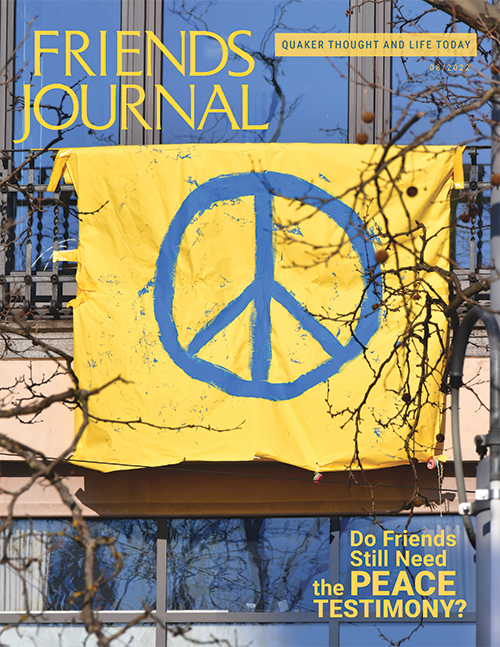
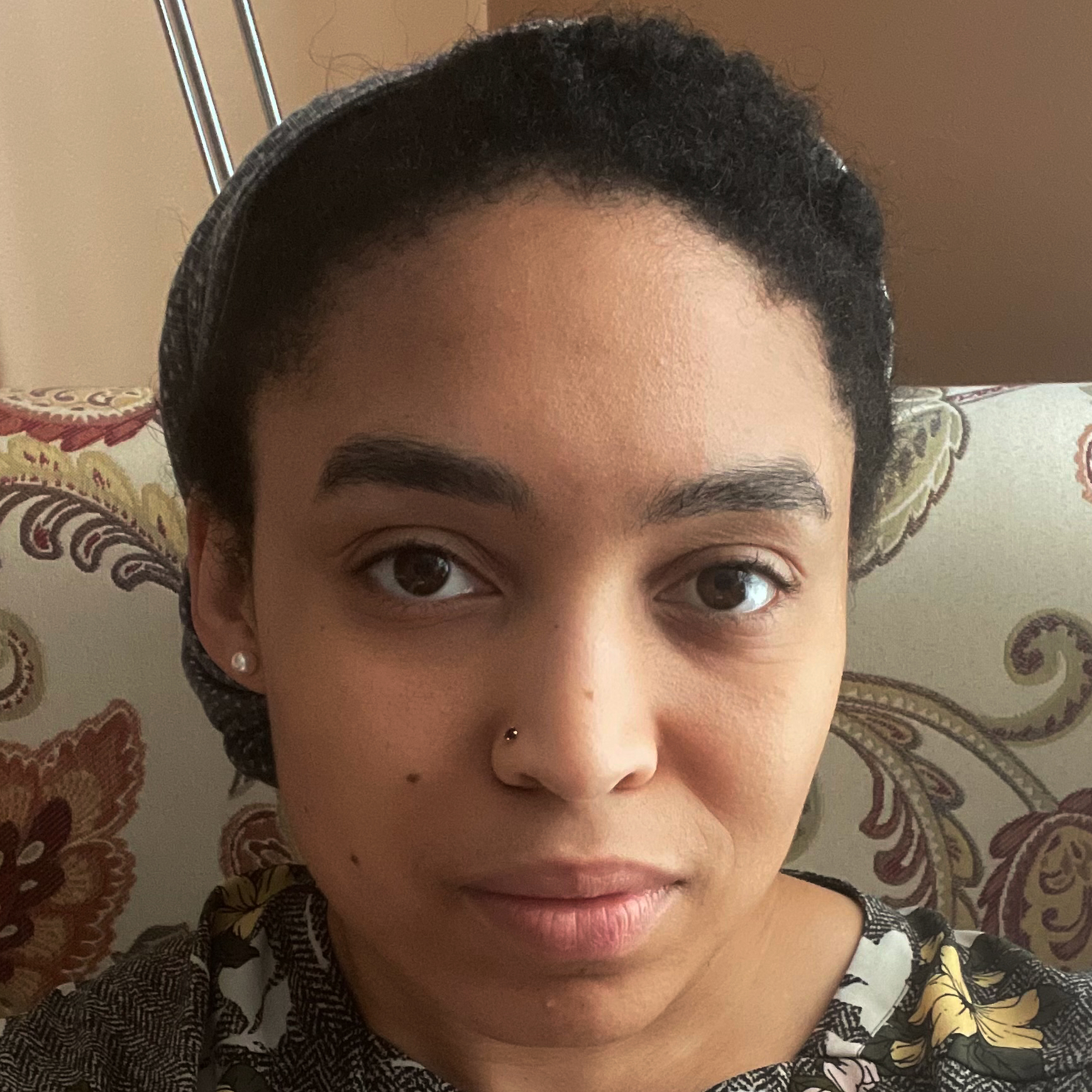
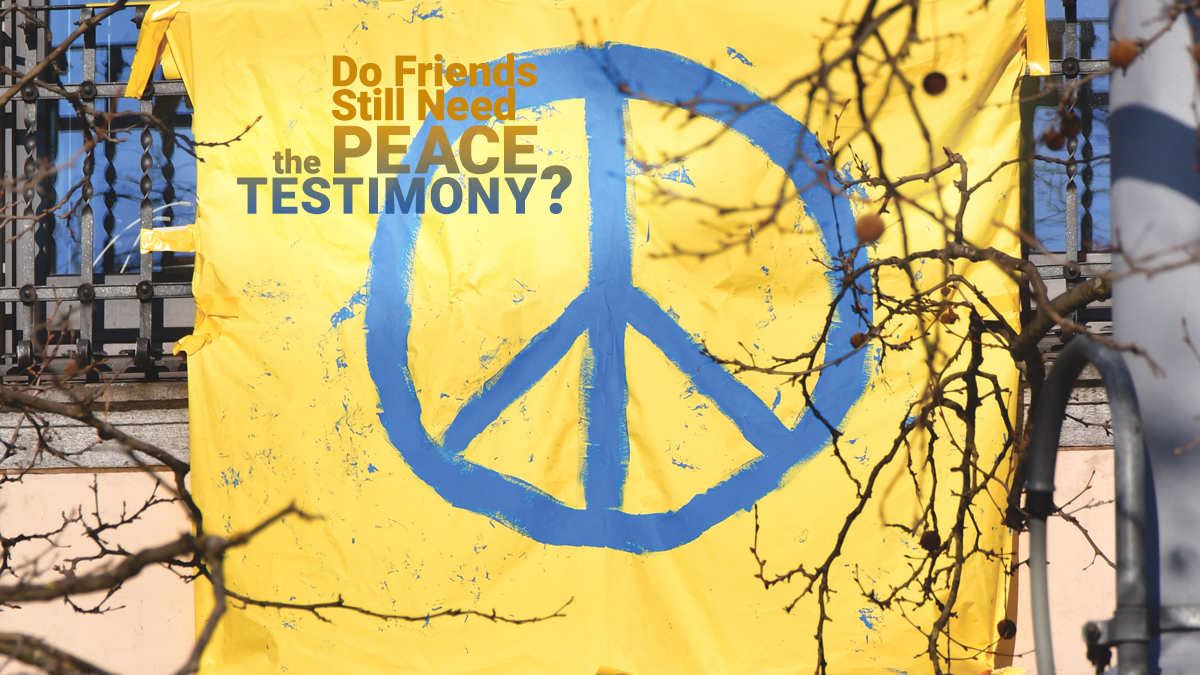
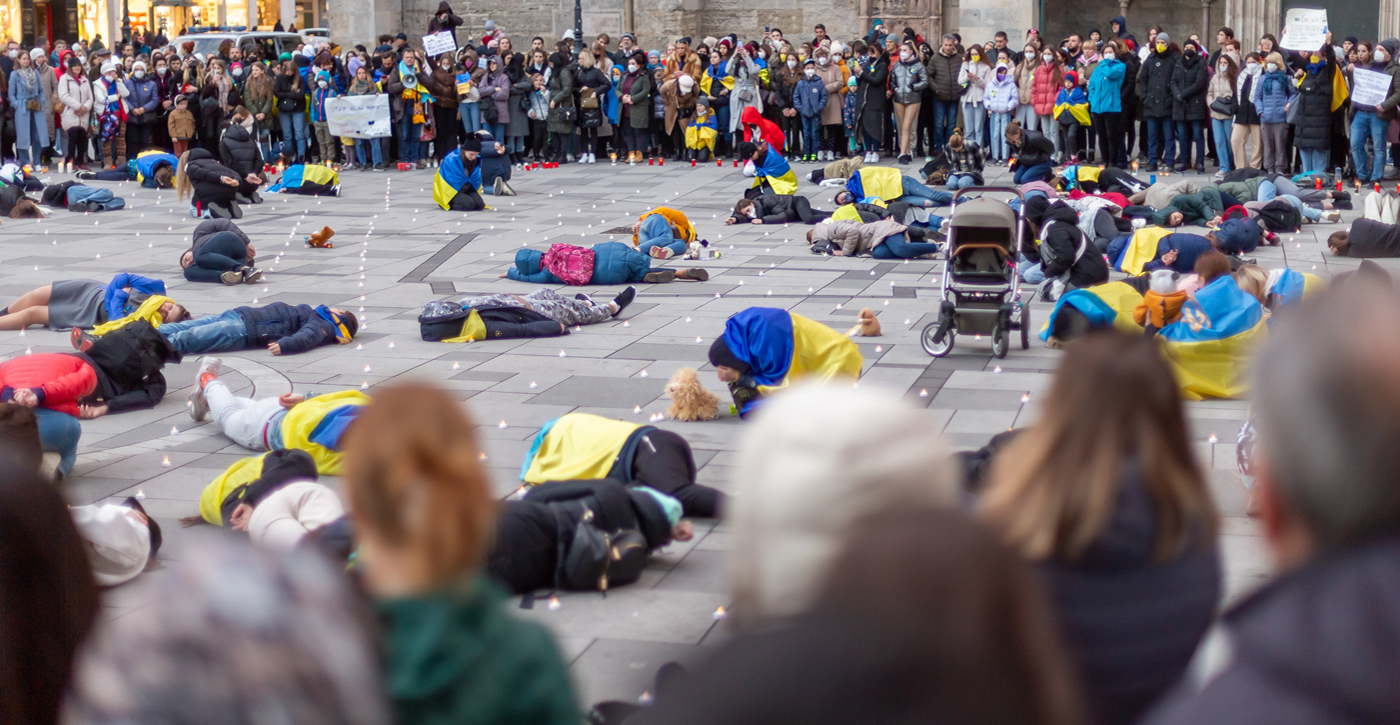

Thank you Ms. Gulizia for this profound and important message for all Quakers. Would that it could be read aloud at every meeting house, and its issues discussed in depth. Every Monthly Meeting should ask the question: Are we really a Religious Society of Friends anymore?
All wars are wrong. Those of the past, present and future. I condemn the USA, its Government and its Corporations that are the biggest arms merchants and war profiteers that the World has ever seen. Thus all wars are all our fault for being tax payers thar pay for these destructive actions. There is no justice in war and war is never just. A to defend a war with merchants of death does not make you a peace maker. You are obfuscating your responsibility to end all armed conflicts if you do defend this doctrine. The Peace Testimony speaks for its self without exception. The Christ said turn the other check, and Jesus meant it! Hold your hand out to your adversary even if they slap it away. There is no way to Peace. Peace is the way.
This is well laid out, and worthy of discussion throughout our Society. One result of identifying the Light with the individual conscience, as many do in our liberal Meetings (I cannot speak for other branches), is that decision-making comes down to consensus, rather than being the sense of the Meeting as to how we are led. This can only lead to fragmentation, since every individual has their own idea of what’s right, and the consensus is just what a given group of Friends can tolerate at a given point in time. The decision will no longer have the power to hold us to support it, since it doesn’t carry the same sense of validity as a decision reached when Friends are unified in perceiving that we have been given the right answer to our question. A decision by consensus may leave us with resignation or acceptance, but a Spirit-led movement gives us joy and gratitude, even when we know it will lead to more hard work and sacrifice in the future.
The acceptance of “just war” is a core belief of mainstream Christianity. So, the 1660 Declaration to Charles II is a radical break from mainstream Christianity and as such, it is a defining characteristic and faith statement of the Society of Friends of Jesus.
When AFSC went all in to support the cause of Ehren Watada, they unquestionably shed themselves of any commitment to that traditional Quaker witness. A little background for those unfamiliar with the case: Ehren Watada volunteered for the U.S. military after 9/11. His desire was to fight in Afghanistan. When he was assigned to Iraq, he refused to go. His position was that the Iraq War was not a just war. He was always, emphatically ready to do his chosen job as a fire support officer. AFSC enthusiastically endorsed Ehren Watada’s principled commitment to just war.
As most Quaker congregations support AFSC, they implicitly support “just war”. So, in that respect, the Quaker peace witness is dead. Quakers have quietly slipped into being indistinguishable from generic Protestants or perhaps Unitarians in many cases. “.. the spirit of Christ, which leads us into all Truth, will never move us to fight and war against any man with outward weapons, neither for the kingdom of Christ, nor for the kingdoms of this world,” is no longer a part of Quaker witness in any meaningful way.
Thank you, Adria Gulizia, for this profound statement of a real dilemma in contemporary liberal Quakerism. I hope many Friends will share it and ponder over it. I am increasingly asking myself, after my membership of over forty years, what is the point of the Religious Society of Friends? How does it differ from many well meaning humanitarian and humanistic organisations? Just to throw in the words ‘spiritual’ and even ‘religious’ as we often do may simply be a formalistic bow in the direction of tradition. The early Quaker revelation was that together through worship we turn inwards to discern the divine will the better to live it out in the world around us. Community, worship, discernment, commitment, all expressed in the way we live our lives seem to me to be at the heart of the Quaker revelation. The way we live our lives is our testimony to truth. Are we creating the divine commonwealth by living it in the here and now?
We now know Scott Simon’s support for the Iraq war was based on jingoism. Brian Garman’s reasoning is likewise. The information we receive from our “trusted” sources is propaganda. US foreign policy is controlled by an enduring group of unelected operatives dedicated to promoting American Empire, even as a new multi-polar world is emerging. That’s where peacemaking needs to be focused.
Before the Iraq war, the UN chief weapons inspector in Iraq, a former US Marine intelligence officer, publicly showed compelling evidence that the WMDs in Iraq had been destroyed. US media ignored him. CIA had warned him to be silent, retaliated against him for the disclosure.
Today the internet provides more channels of information. What official reports do not say is the conflict with eastern Ukraine Russian speaking provinces began in 2014. Without knowing that history, there can’t be viable judgments.
For many years Russia has warned that Ukraine in NATO is not acceptable because of NATO’s clear intent to encircle Russia militarily. But since 2014 the US has been training and equipping the Ukraine military to NATO standards. In December 2021 Vladimir Putin proposed a new mutual security plan to the US and Europe. They scornfully rejected it.
In February 2022, as the Ukraine army massed on their borders, the eastern provinces asked for recognition as independent states. The Russian Duma recognized them and signed protection agreements with them. When Russia moved troops into Ukraine it was done according to UN Charter specifications. The terrible war crimes are being committed by undisciplined Ukrainian troops against Russian speaking Ukrainians.
It’s clear that the US and UK are controlling Ukraine operations. Zelensky is a poster boy. Very tragically he is not allowed to negotiate to end the war as his country and its people are being torn apart. Here’s the kind of discussion Friends should be having about Ukraine and Taiwan. http://www.youtube.com/watch?v=_A-c0qd7g1c
At the distance of two decades, I confounded the Afghan war and the Iraq war. I do not know if Scott Simon supported the Iraq war. His “Reflections on the Events of September 11” was his justification of the US “military operation” in Afghanistan. I actually wrote a critique of it at the time, so how could I forget?! https://quaker.org/legacy/our-vision.html Perhaps because our testimony against war holds for all military actions, in spite of FCNL’s misstep with Ehren Watada. But the lasting lesson for anti-war action is that peacemaking needs to happen before hostilities become physical, which means that peacemakers need to be paying attention in peacetimes.
Bingo.
As a European friend wrote, US goal is to bleed Putin.
Few have any clue about the history of this war. Timeline here of Ukraine and US provocations here: https://zeitgeistcontext.wordpress.com/2022/04/04/ukraine-debacle-timeline/
I attended a liberal Friends high school in 1990s, and consider myself one of those liberal friends raised believing in the Light as separate from Christian theology. However, I do not feel any connection to this description of liberal Friends perspective. We are not agnostic, the historical evolution of Light away from Christ-centered Christianity was an American path tied to a movement to expand the “higher power” to include Native American spiritual common ground. In this perspective, Christ is an example (like Ghandi or Buddha or Mother Theresa…) of a spirit-led life (and the Bible is source of this role model). We don’t disbelieve, just consider it 1 of many examples. However, belief in a higher power (Light/Holy Spirit/Great Spirit/God or Goddess or Gaia…) is essential to Quaker belief. Otherwise, what small still voice would we be waiting to hear? In this liberal interpretation, the peace testimony is a necessary natural development that occurs if you practice the fine art of acknowledging “that of God (Light/Spirit) within each person” because deliberate violence is impossible if you See their Inner Light. Since you cannot in good conscience hit someone in front of you while Seeing their Light, it would be hypocritical to endorse war on a larger, less personal scale. But, as the legend of William Penn’s wearing a sword implies, one may try to wear it for as long as one can. (If you are actually practicing acknowledging each person’s Light AND are listening to guidance from the Light regularly, presumably the contradiction will nature until you are no longer able to support violence. From the inside…) This is the basis of liberal Quaker belief as I was raised in it; we don’t force others externally but do consider it unQuakerly (and a sign that an individual hasn’t yet matured into the Peace testimony, but may be undergoing experiential learning process) if a fellow Quaker is questioning this.
What is a “Peace Testimony”? We witness for peace but believe war will continue forever and so a few virtuous people need to stand against that tide. But compare fighting war with fighting disease, or climate change, or gun use. Human made problems that we can see solving. Jesus had a divine inspiration to try a revolutionary approach to ending war, loving your enemy. The old joke: Jesus said love our enemies and love our neighbors and that makes things easier because they are often the same people. In East Africa Quakers follow that lead and help people who killed each others’ families understand and, yes, love one another.
War is obsolete. It doesn’t get us what we want. Wars kill many more civilians than soldiers, destroy homes and economies, displace people. Governments are preparing for ‘future wars’. What? Those wars ‘envision’ destroying populations with diseases or chemicals. They use computers to smash infrastructure, and rob distant citizens. War has become indistinguishable from criminal activity.
How do we start teaching children that peacemakers are more glamorous than soldiers? How do we create peace academies that are as rigorous and as influential as military academies? How do we export ‘negotiation technology’ to developing nations instead of bribing them with weapons? War is not weather. It is something that we humans make. Can we change those habits? Hell, we have changed the weather; and we are trying hard to change it back.
Does God want us to stop wars? Jesus said God wants us to love one another. Why? Jesus was a pragmatist. Because it works better.
Right on, Ms. Gulizia. I have urged my Meeting to read and ponder your terrific article. On a recent First Day I noticed someone in our Meeting (a member) sporting an veteran’s cap from his days in the Army, during Meeting for Worship. I think many people in my Meeting believe the peace testimony to be optional.
Yes, an excellent article
Your comments look like things are still much the same. When I was at Earlham, a friend was pastor of a meeting that had an Army general as a recorded member (his parents were there; he was far away). Now, I did wear my Marine field jacket in those days (no insignia) simply because it was the warmest jacket I had. https://snowfar4.wixsite.com/christianpacifism/about
Christopher King:
Thank. Very well said. I appreciate your informative and helpful witness.
It seems most who hold to the peace testimony have abandoned Biblical pacifism for a humanistic, idealized version. Among those who are still orthodox Christians, most seem to have been Americanized and lay it aside, or remain deathly silent about it. https://christianpacifismblog.wordpress.com/2012/11/15/30th-anniversary-ebook-edition/
This is quite simply an essential message for Friends and for the world. Beautifully written and perfectly stated. I am profoundly grateful to the Source and to the writer, Adria Gulizia.
Through the inshining power and presence of the spirit of Jesus Christ upon my conscience and consciousness, it is discovered to me that the act of physically harming another is out of the awareness of Christ’s presence. Such behavior would draw me out of my experience of and habitation in the continuous and unreflected presence of the indwelling Spirit. The concept of peace is of the reflective nature. The presence of the Spirit in my conscience is drawn me out of being guided and informed by the reflective nature and its thought-agents like peace. In this way, I do not promote the reflective nature I testify to the witness of awareness of the spirit of Christ’s motion which, in the case of physically harming others, threatens to diminish habitation within the inshining Light itself in itself. My research suggests this living witness I share with the witness of many early Quakers.